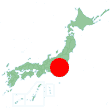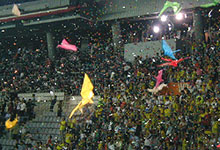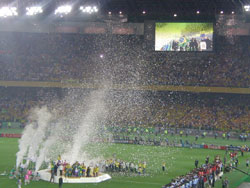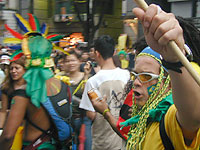
 Yokohama
YokohamaKids' Activities 22
Paper Cranes Mark End of World Cup
 |
|
| Cranes float down into the stadium. |
International Stadium Yokohama, June 30. As 69,000 people watched from the stands, Brazil beat Germany to claim the World Cup and bring an end to a month of thrilling soccer. After the match, 2.71 million folded paper cranes floated down from the stadium's giant roof onto the spectators, dancing in the spotlights as they came down. It was a beautiful way to end this month-long festival hosted jointly by Japan and South Korea.
 |
|
| The closing ceremony. |
The origami cranes were made by kids from about 3,000 elementary and middle schools all over Japan, as well as adults, in answer to a call from JAWOC (the Japan Organizing Committee for the 2002 FIFA World Cup Korea/Japan). JAWOC started calling for the cranes in April on its website, and shops selling official World Cup merchandise also joined in the effort. It took the folders about two months to make over 2.7 million cranes. JAWOC had announced that the cranes would be dropped from the air at the end of the World Cup final but had kept the dropping method secret. In the end, the cranes were released from boxes attached to the stadium roof and flew around in all directions, blown by the wind and air currents in the stadium. The cranes were made with special light paper so that they floated and danced in the air as they fell gently onto the fans.
 |
|
| Brazil supporters. |
Photos courtesy of Jun Kazama.
